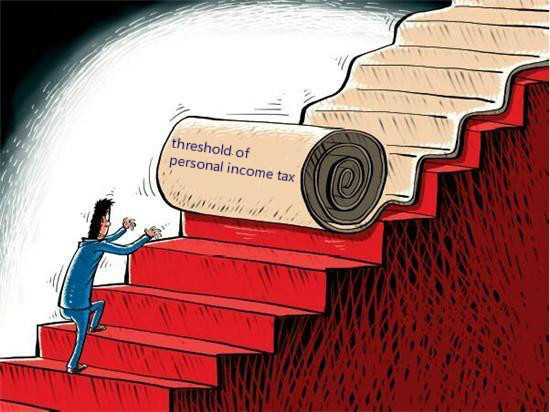Personal income tax cuts strive to seal income gap

The new threshold and tax rate will reduce the burden of most taxpayers—particularly those in middle or lower income groups, helping to increase citizens’ income and promote consumption.
A higher threshold is the major focus of this personal income tax reform. The amendment raises the taxable income from 3,500 yuan per month to 5,000 yuan per month. In annual terms, the figure has been lifted from 42,000 yuan to 60,000 yuan.
In 2017, employees in the above-scale companies earned 61,578 yuan each year on average, according to a recent survey by the National Bureau of Statistics. From this aspect, the proposed individual taxation threshold is suitable for the current income of ordinary employees.
The new threshold and tax rate will reduce the burden of most taxpayers—particularly those in middle or lower income groups. Such measures help to increase citizens’ income and promote consumption, said Finance Minister Liu Kun. Also, the amendment has taken various factors into consideration, such as the rising cost of living.
Some related measures are also taking effect. Li Xuhong, director of the Research Center for Financial and Taxation Policies and Application at the Beijing National Accounting Institute, explained how the amendment will change taxation: If an employee earns 10,000 yuan and his social insurance totaled 2,000 yuan per month, he currently has to pay 345 yuan for individual income tax. After the reform, his tax payment will be reduced by about 74 percent to 90 yuan. When the income reaches 15,000 yuan, the tax will drop by roughly 57 percent from 1,370 yuan to 590 yuan.
The new taxable income threshold and other new measures are major concerns to many individuals. In terms of taxation system reform, the amendment has made strides in establishing an integrated taxation mechanism while retaining the previous separate tax mechanism. There are a total of 11 types of income. The integrated tax mechanism covers four kinds of work income—wages and salaries, labor service payments, author remuneration as well as royalties—and they apply a progressive rate. Other types of income will still be collected separately, such as interest, dividends as well as income gained from property rental and transfers.
“The separate taxation mechanism costs little in terms of collection and regulation, but it falls short when it comes to fairness,” said Zhang Bin, a research fellow from the Institute of Finance and Economics at the Chinese Academy of Social Sciences. Under this mechanism, tax accounting only focuses on money rather than considering citizens’ total income, particularly of the people with multiple income streams. Therefore, it becomes more difficult to deal with the income gap among social groups.
“It is not legitimate for individuals to pay income tax by each category because such method can lead to imbalance among various income types,” Li Xuhong said. Below 8,000 yuan, the tax rate of labor service payments is much higher than that of wages or salaries, even though they are both work income. Some people pay excessive tax while some pay inadequate tax. This is unfair, Li added.
“The integrated taxation method definitely deserves attention, because it can measure the income gap more effectively and play a bigger role in closing it,” said Bai Jingming, deputy president of the Chinese Academy of Fiscal Sciences. In addition, the method calls for better regulation, allowing taxpayers to declare income annually in the future and replacing the current model under which workplaces withhold and remit tax each month for their employees. If so, taxation, financial and banking departments need to form partnerships with each other and ensure efficient personal income taxation with the help of internet technologies and more detailed information about individual income, Bai added.
The amendment added regulations to prevent tax evasion by empowering taxation departments the right to adjust the mechanism. The regulations target various acts. For example, some people violate the principles of independent transfers or go overseas to avoid paying tax.
“A functional and comprehensive taxation system fuels fairness and ensures the reform’s effective implementation,” said Li Xuhong, adding that domestic financial and taxation organs have done a lot of preparatory work in recent years. The future task is to enhance coordination with multiple social actors and close the loopholes, thus paving the way for a successful taxation reform.
This article is edited and translated from the People’s Daily.
(edited by MA YUHONG)

 PRINT
PRINT CLOSE
CLOSE